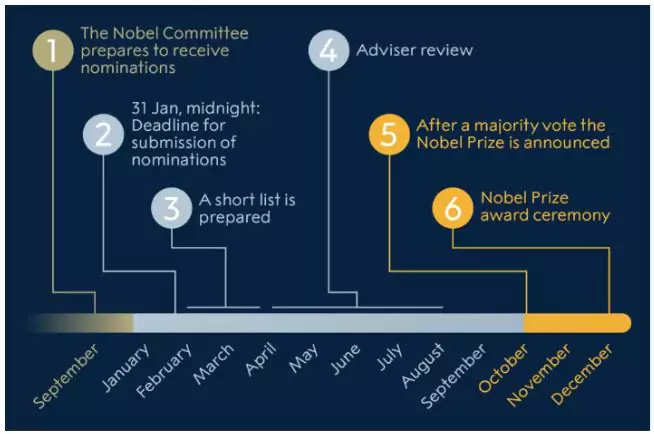Recently, Cambodia’s Prime Minister nominated U.S. President Donald Trump for the Nobel Peace Prize, praising his “extraordinary statesmanship” in helping resolve a border dispute between Cambodia and Thailand.
About Nobel Prize
- Established in 1895 under the will of Alfred Nobel.
- These awards are presented annually by:
- Royal Swedish Academy of Sciences – Physics, Chemistry, Economics
- Nobel Assembly at Karolinska Institute – Medicine
- Swedish Academy – Literature
- Norwegian Nobel Committee – Peace
- Nobel Peace Prize: Considered the most prestigious of the five Nobel Prizes.
- Awarded annually to individuals or organizations that contribute significantly to peace efforts.
- Ceremony: Held on December 10 (Nobel’s death anniversary) in Stockholm and Oslo; laureates receive a medal, diploma, and cash award.
Who Can Nominate Nobel Peace Prize?
- As per the Nobel Committee’s rules, nominations can only be submitted by certain categories of people:
- Members of national parliaments and governments.
- Heads of state and international courts.
- University professors in history, political science, law, philosophy, and theology.
- Previous Nobel Peace Prize laureates.
- Members of the Norwegian Nobel Committee.
Nomination Process

- Committee Review: The Norwegian Nobel Committee evaluates the nominations, prepares a shortlist, and seeks external research inputs.
- Decision Timeline: The nomination and selection process takes around eight months before the final decision is made.
- Confidentiality: The names of nominees remain secret and are disclosed only after 50 years.
- Notable Example: In 1939, Swedish parliamentarian Erik Brandt nominated Adolf Hitler, but the nomination was later withdrawn
Eligibility & Definition of Peace
- Alfred Nobel’s will stated the prize should go to the person who did the most work for:
- Fraternity between nations
- Reduction of armies
- Promotion of peace congresses
- Over time, the scope has expanded to include gender equality, nuclear non-proliferation, and broader efforts for peace.
US Presidents Who Have Won the Nobel Peace Prize
- Theodore Roosevelt (1906): Negotiated peace in the Russo-Japanese War.
- Woodrow Wilson (1920): Efforts in ending World War I and creating the League of Nations.
- Jimmy Carter (2002): Promoting peaceful conflict resolution, democracy, human rights, and development.
- Barack Obama (2009): Awarded early in his presidency for efforts to strengthen international diplomacy — a decision seen as controversial.
Indian Nobel Laureates
- Rabindranath Tagore (1913, Literature): First Indian Nobel laureate, awarded for Gitanjali.
- C.V. Raman (1930, Physics): Recognised for the discovery of the Raman Effect.
- Har Gobind Khorana (1968, Medicine): Awarded for work on the genetic code and protein synthesis.
- Mother Teresa (1979, Peace): Honoured for humanitarian work with the Missionaries of Charity.
- Subramanyan Chandrasekhar (1983, Physics): Known for the Chandrasekhar Limit in stellar evolution.
- Amartya Sen (1998, Economics): Contribution to welfare economics and poverty studies.
- Venkatraman Ramakrishnan (2009, Chemistry): Awarded for studies on the structure of ribosomes.
- Kailash Satyarthi (2014, Peace): Recognised for efforts against child labour and exploitation.
- Abhijit Banerjee (2019, Economics): Awarded for experimental approach to alleviating global poverty.
|
![]() 19 Aug 2025
19 Aug 2025

